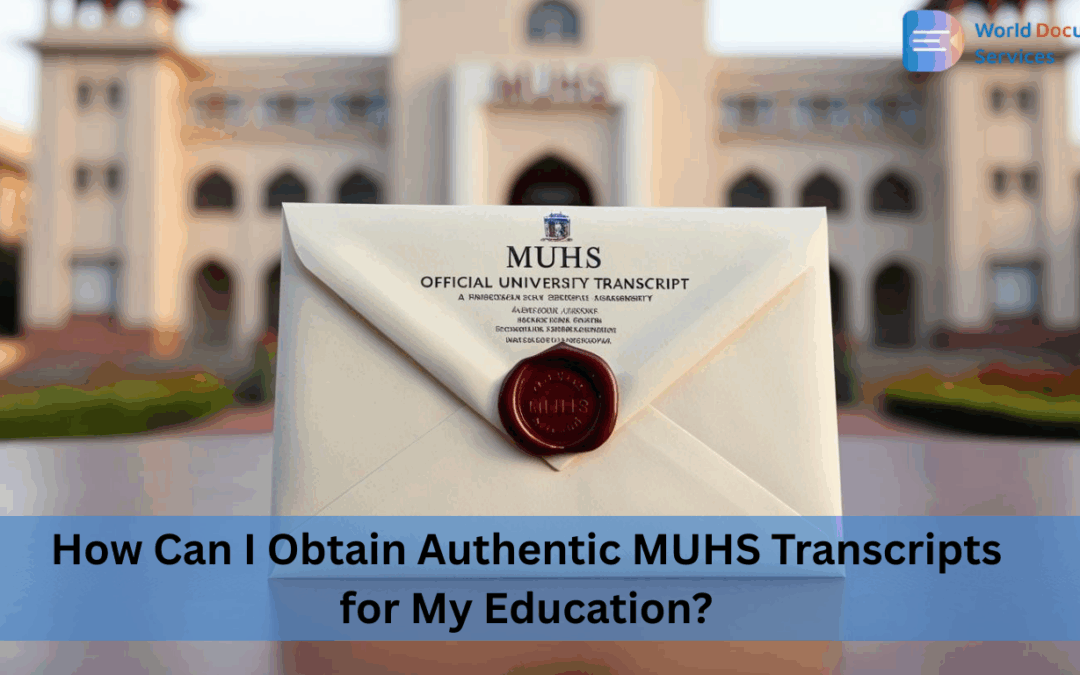
by Aayushi Thadwani | Apr 26, 2025 | Most Viewed, Transcripts from University
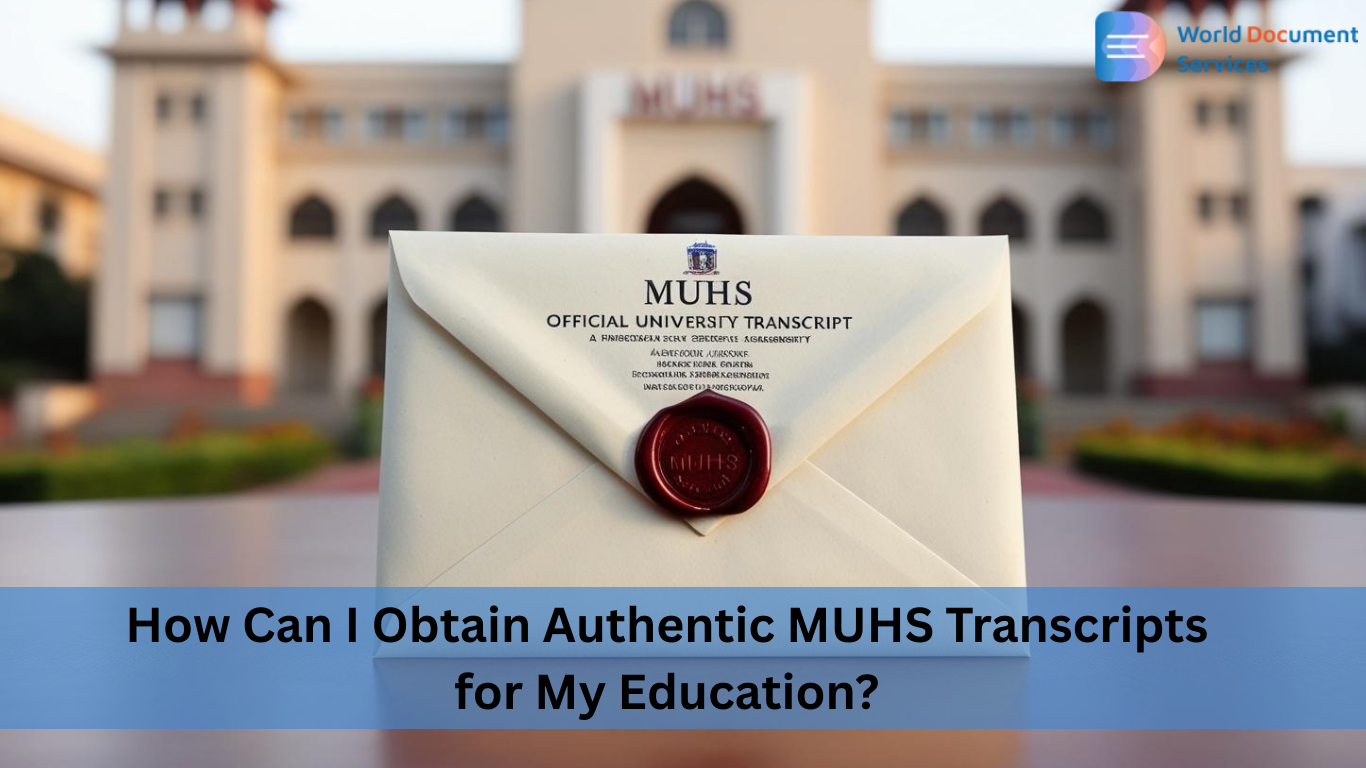
For students and professionals who have graduated from the prestigious university Maharashtra University of Health Sciences (MUHS), transcripts are essential for pursuing higher education, licensing, and immigration opportunities internationally. These official academic records serve as proof of your candidacy and are critical for processes like credential evaluation by organizations such as WES (World Education Services), ECE, IQAS, and others.
This comprehensive guide will help you understand how to obtain your MUHS transcripts, complete MUHS document verification, and benefit from third-party support like World Document Services (WDS) for a hassle-free experience.
Need help with your IK MUHS Transcript? Contact Us Now!
What Are MUHS Transcripts?
MUHS official transcripts are an official summary of marks or grades that outline your whole academic history in one certified document. Unlike a semester-wise mark sheet, a transcript can summarize all of your courses, with all grades and credit hours awarded. The document is sealed, stamped, and issued by MUHS, making it acceptable for international academic and professional purposes.
Transcripts from MUHS are commonly required for the following:
- Admission to foreign universities
- Credential evaluation by agencies such as WES
- Licensing or employment abroad
- Immigration and permanent residency applications
Transcripts must go through MUHS transcript verification to be considered authentic. Most of the organizations will reject the transcripts unless they are sent directly from MUHS University in a sealed envelope or by an authorized partner.
Step-by-Step MUHS Transcript Application Process
To obtain your MUHS transcript, follow these steps:
1. Keep the documents ready
Gather the following documents:
- All mark sheets (year-wise or semester-wise)
- Degree certificate
- Internship completion certificate (if applicable)
- Aadhaar card or passport copy
- Passport-size photographs (as required)
Ensure that all documents are legible and have consistent details, especially your name.
2. Initiate MUHS Transcript Application
You can apply for MUHS transcripts online through the university’s official website or authorized partners. If you’re applying directly:
- Visit the MUHS transcript section
- Register or login.
- Fill out your academic and personal details.
- Upload scanned documents
- Indicate the purpose (e.g., WES, ECE)
3. Pay the Applicable Fees
MUHS charges between INR 15,000 and INR 18,000 for transcript processing, depending on the number of copies and destinations. Keep a copy of the payment receipt for tracking.
4. Document Verification by MUHS
Once your application is submitted, MUHS will verify your academic records. This MUHS document verification step is essential for confirming the authenticity of your credentials.
Delays can occur if
- Documents are unclear
- There are name mismatches.
- Incomplete submissions are made.
- Ensure all documentation is accurate and submitted in the correct format.
5. Transcript Dispatch
After verification, transcripts are sealed in an official MUHS envelope. The documents can be:
- Sent directly to credential agencies like WES
- Mailed to your residential address
- Picked up in person or through an authorized third party
How Can World Document Services (WDS) Help?
Navigating the MUHS transcript application and verification process from overseas or even within India can be time-consuming and frustrating. That’s where World Document Services steps in.
World Document Services offers:
- End-to-End Transcript Assistance: From collecting documents to final delivery
- University Liaison: We communicate directly with MUHS on your behalf
- Global Logistics: Transcripts are securely shipped to WES, ECE, or other international destinations
- Real-Time Tracking: Know the status of your application at every step
- Error-Free Applications: Avoid common pitfalls that lead to rejection or delays
Why Choose WDS for MUHS Transcript Services?
- Trusted by thousands of Indian and international students
- Fast processing with no unnecessary delays
- Strict compliance with WES and other credential body standards
Whether you’re located in India or abroad, WDS ensures a streamlined, stress-free experience for obtaining your MUHS transcripts.
MUHS Transcripts for WES: What You Need to Know
WES (World Education Services) has strict guidelines for receiving transcripts:
- Transcripts must be sent directly from MUHS or its authorized agent (such as WDS)
- Documents should be in sealed envelopes, stamped and signed across the flap.
- WES reference number must be included with the application
WDS ensures that:
- All required WES documents are attached
- Proper format and packaging are followed.
- MUHS standards are strictly adhered to
- Your transcripts are delivered to WES on time.
- Avoid common mistakes like sending open envelopes, incorrect formats, or missing WES reference numbers – WDS takes care of it all.
Tips for a Successful MUHS Transcript Process
- Double-check that your name and birthdate match across all documents.
- Keep multiple sets of certified copies for backup.
- Include all semester-wise mark sheets in chronological order.
- Upload high-resolution scans of every required document.
- For WES, make sure your profile is created before applying to MUHS.
- Retain digital copies of every confirmation, invoice, and dispatch detail.
Frequently Asked Questions (FAQs)
Q: How long does MUHS take to issue transcripts?
A: Normally, it takes about 4 to 6 weeks; however, by requesting our services, WDS will help expedite your request.
Q: Can I apply for MUHS transcripts entirely online?
A: The application initiation is online, but certain steps like document submission or collection may involve offline steps unless you use a service like WDS.
Q: Are MUHS transcripts essential for credential evaluation agencies like WES?
A: Yes, WES and other agencies will not process your application without verified institutional transcripts.
Q: Can I authorize WDS to apply and send documents from outside India?
A: Absolutely! Use WDS and authorize us to do your entire application process and document send process so you visibly won’t waste time or money making a costly mistake.
Q: Can I order multiple transcript copies in one application?
A: MUHS does provide seven copies at once; however, if you want further extra copies, you can apply as per your requirement.
Q: What if there is a mismatch in my documents?
A: Submit a notarized affidavit or supporting legal documents to resolve discrepancies.
Q: How do I track the status of my transcript application?
A: WDS provides a dedicated tracking dashboard. If applying directly through MUHS, you may need to follow up manually.
Serving Students Across the Globe
At World Document Services, we’ve helped thousands of students across the globe access transcripts, get credentials verified, and move one step closer to their dream goals — whether it’s studying in Canada, migrating to Australia, or working in the U.S.
We understand the intricacies of the MUHS transcript process and provide unmatched support in managing both local and international document requirements.
Ready to Request Your MUHS Transcripts?
Get started today with World Doc Services – India’s trusted platform for academic document solutions.
📍 Visit: www.worlddocservices.com
📧 Email: bd@worlddocservices.com
📱 WhatsApp/Call: +91-6232670879
Final Thoughts
Obtaining official MUHS transcripts is a crucial step for your international academic and professional goals. However, this can be complex without proper information or support on-site. Whether you are interested in a credential evaluation through WES or higher education abroad, make sure you have filled out your transcript application accurately, thoroughly, and compliantly.
World Document Services makes this job easy from MUHS transcript application through MUHS transcript verification, packaging, and worldwide forwarding. We will take care of the identifiers so you can focus on your goals.
Download the World Document Services App
You may enjoy a hassle-free experience by downloading our mobile app from either the App Store or the Play Store. It works with both iOS and Android devices.
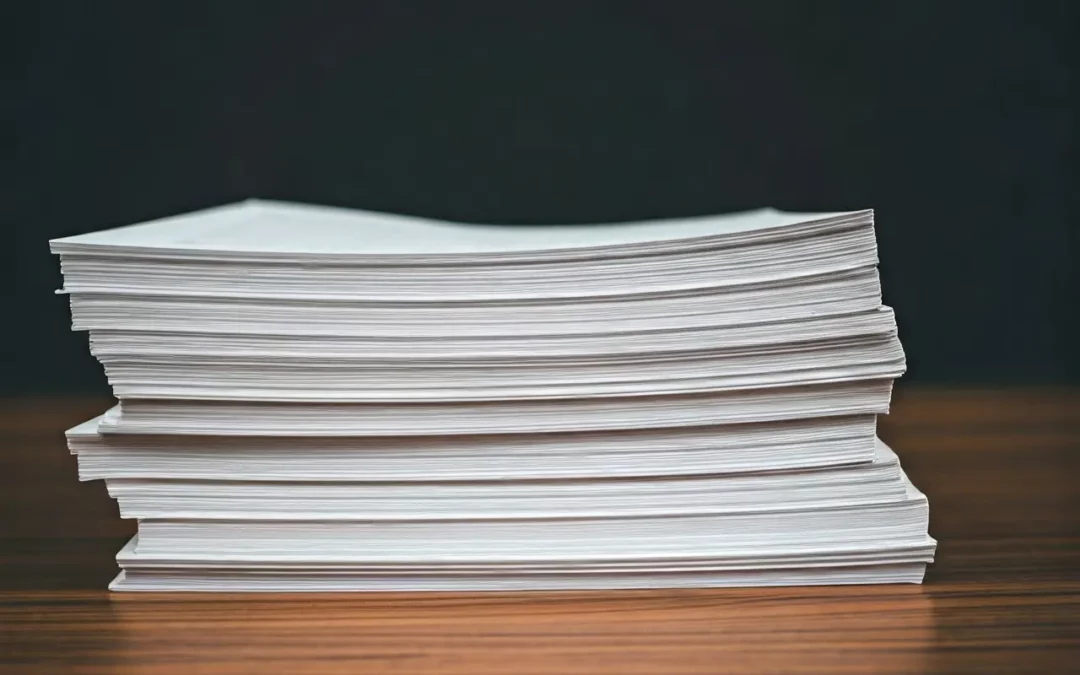
by Aayushi Thadwani | Apr 17, 2025 | Most Viewed, Transcripts from University
Applying to international universities from JNTU can seem daunting, especially when it comes to understanding the required transcripts. This guide will break down everything you need to know in simple terms, so you don’t feel overwhelmed.
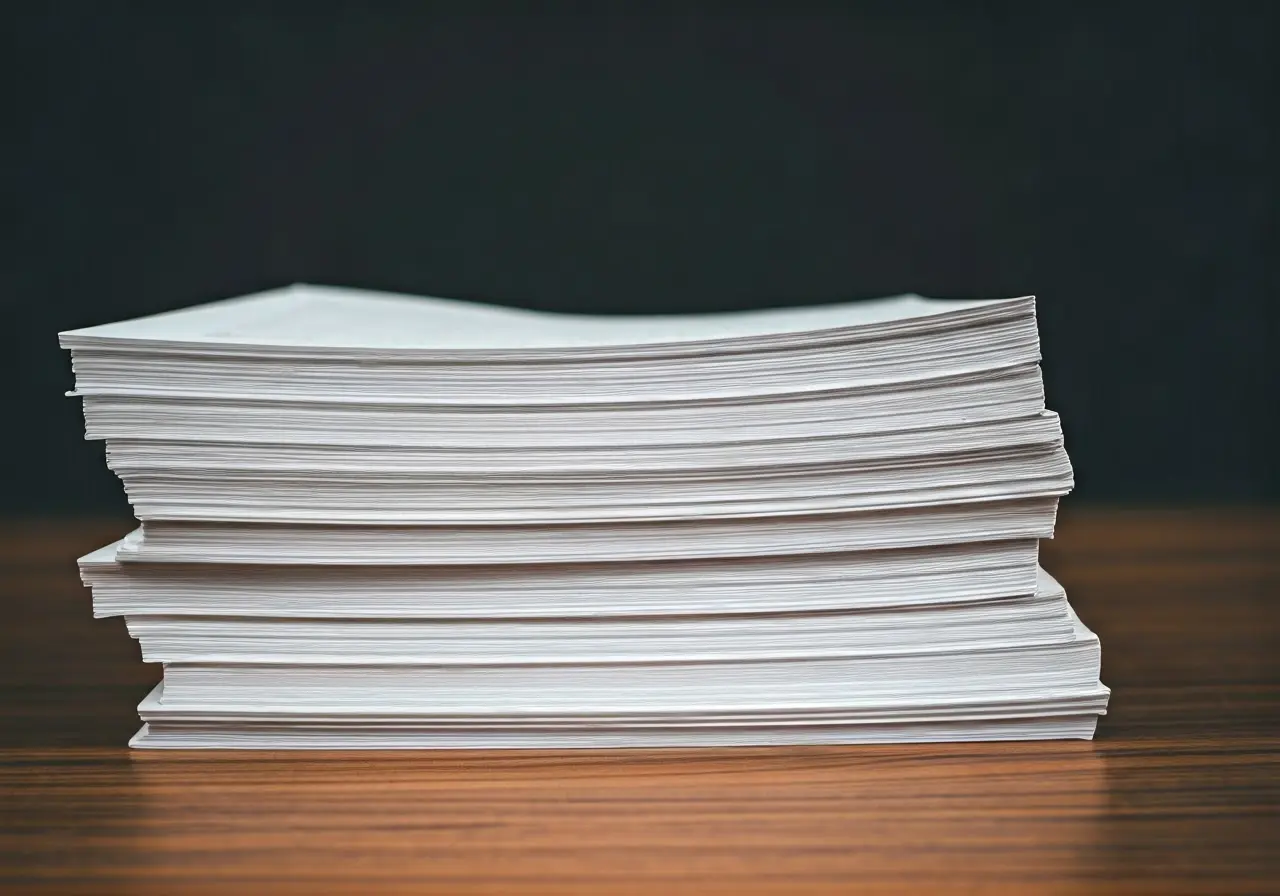
Understanding the Basics of JNTU Transcripts
JNTU transcripts provide a detailed record of your academic performance. They include your courses, grades, and credits. Understanding these elements is crucial for international applications. Often, the format of JNTU transcripts showcases your cumulative performance, allowing for a comprehensive view of your academic journey. Every course completed at JNTU, whether it’s an introductory subject or an advanced elective, is meticulously documented, highlighting the importance of each class in your educational narrative.
The transcripts are not just a statement of your academic initiatives but a reflection of your dedication and passion for your chosen field. These documents are carefully structured, making them an invaluable asset in your pursuit of further studies abroad. They essentially narrate your educational story, from your first day at university to your recent academic endeavors, encapsulating various factors such as grade distribution and credit points.
One critical aspect to note is how these transcripts are assessed by international institutions. Universities worldwide assess these documents to determine your academic readiness and compatibility with their learning environment. A transcript’s credibility and precision can significantly impact application evaluations. Thus, it’s crucial to ensure that what is reported aligns with your actual academic achievements, eliminating any discrepancies that could pose challenges or delay your international ambitions.
Why Transcripts Matter for International Applications
Transcripts are a key component of your application. They help international universities assess your academic readiness and compare your academic background with their requirements. For students from JNTU, these documents serve as proof of the knowledge and skills acquired during their university years. The meticulous detail within these documents provides universities with clear insight into your educational competency.
Universities abroad often look for specific academic markers that signal a candidate’s potential for successful integration into their programs. These include core subjects, elective choices, and academic achievements. Accurate JNTUK transcripts are therefore essential, as they ensure that all information is up-to-date and reflective of true academic performance. This accuracy is particularly crucial for students aiming for competitive programs that have strict academic prerequisites.
Without accurate JNTU transcripts, even the most promising candidates may find themselves at a disadvantage due to potential misunderstandings or misinterpretations of their academic standing. Therefore, before sending out applications, ensure your transcripts are complete and error-free. Even seemingly minor errors can lead to significant issues during the application review process, affecting entry into your desired program.
How to Obtain Your JNTU Transcripts
Obtaining your JNTU transcripts can easily be done through the university’s administrative office. You’ll need to fill out a request form and pay a nominal fee to receive the documentation you need. To streamline this process, ensure that all your personal information and course details are readily available, as this will assist the administrative staff in processing your request promptly.
Beyond traditional methods, World Document Services offers digital solutions for securing transcripts efficiently. This service simplifies obtaining JNTU Kakinada transcripts, providing swift access to essential documents such as mark sheets and e-transcripts. Leveraging such services can save time and prevent potential inconvenience, especially when preparing multiple applications with tight deadlines.
Another critical consideration is the delivery method of your transcripts. While acquiring physical copies is essential, assessing if your target institution accepts electronic submissions is vital. Electronic transcripts are often preferred for their timeliness and security. Researching each university’s transcript policies is vital to formatting your application correctly and ensuring a seamless submission process. This strategic foresight can mitigate common issues and facilitate a smoother application journey.
Common Challenges and How to Overcome Them
While applying internationally, students often encounter challenges such as document verification and differing grading scales. Understanding and addressing these issues early can simplify the process. Variations in grading systems, for instance, can lead to confusion about academic standing. Partnering with services like Worldwide Transcripts can provide clarity and help accurately translate your academic achievements per global standards.
Another common hurdle is the authentication of documents. Ensuring your JNTU transcripts and supporting documents are endorsed by recognized verification bodies is crucial for global acceptability. Addressing authentication needs promptly can prevent delays and enhance the legitimacy of your application, providing assurance to international institutions regarding the authenticity of your credentials.
Preemptively obtaining multiple copies of your transcripts can also mitigate potential obstacles. This foresight allows for flexibility in sending applications to different institutions simultaneously, reducing the stress of managing multiple requests. Lastly, continually checking university-specific requirements and timelines ensures you can adapt to unforeseen changes smoothly, preserving your chances of successful application submissions.
Evaluating JNTU Transcripts for International Standards
Most universities employ a credentials evaluation service to interpret your JNTU transcripts. Knowing how these services work can help you better prepare your documents appropriately. Evaluation services systematically convert your grades and credits to align with international academic benchmarks. This conversion is pivotal in ensuring that foreign universities can accurately assess your academic potential.
Services like ECE and AICE assist in this evaluation process by adhering to established standards, which allows for a fair assessment of your capabilities. These evaluations are crucial, especially when your GPA or class rank must be translated into a system compatible with the specific requirements of the university you are applying to.
Understanding the nuances of these evaluations can empower you to proactively address questions about your transcripts, ensuring all relevant information is accurately conveyed. Supplementing your transcripts with a personal statement or letters of recommendation can also provide additional context for your academic journey, helping international admission boards appreciate your unique educational experiences and achievements.
Wrapping Up: Confidently Handling JNTU Transcripts for Global Opportunities
Navigating the world of international applications with JNTU transcripts may initially feel like a challenge, but by understanding your transcripts, the application process, and the evaluation methods, you can confidently pursue your educational ambitions abroad.
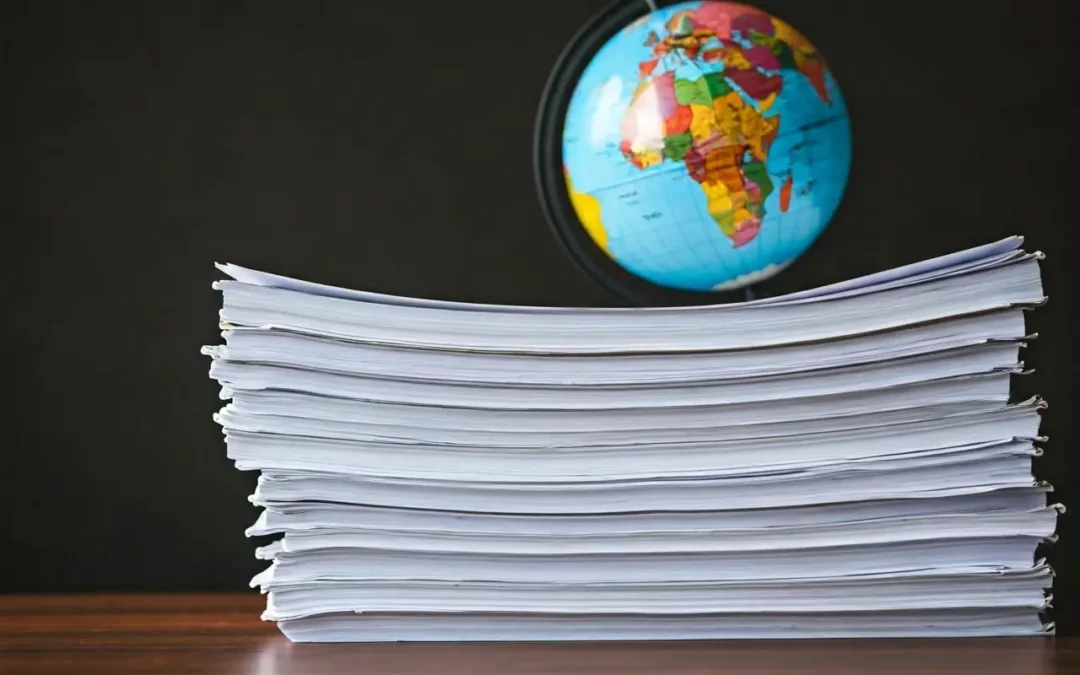
by Aayushi Thadwani | Apr 5, 2025 | International Studies, Most Viewed

Navigating the International Education Research Foundation process (IERF) can be a very daunting process for students, professionals, and even immigrants seeking credential evaluation in the States. Whether you need an IERF credential evaluation for further studies, employment, or professional licensing, understanding the complete process is crucial to ensure a smooth application.
This guide tracks down the IERF evaluation steps, including IERF academic transcript verification, IERF academic credential assessment, and the foreign education equivalency process, so you can confidently prepare for your evaluation.
Need help with your International Education Research Foundation Process? Contact Us Now!
Understanding the International Education Research Foundation (IERF)
The International Education Research Foundation (IERF) is one of the earliest and most recognized credential evaluation agencies in the United States. Since 1969, IERF has provided assessments of international academic qualifications to determine their U.S. equivalency.
Employers, licensing boards, and universities depend on IERF academic credential assessments to verify the authenticity and level of foreign academic and educational achievements. If you have studied in any foreign country and need your credentials recognized in the U.S., the IERF credential evaluation process is crucial for bridging the gap between international education systems.
Read more: 8 Ways International Education Research Foundation Certification Can Boost Your Career Overseas
Below are the steps in the IERF Evaluation Process
Step 1: Decide Your Evaluation Type
IERF offers different forms of reports based on your specialised needs:
- General Evaluation Report – Provides an overall U.S. equivalency of your foreign education.
- Detail Report – Includes a course-by-course analysis with U.S. semester credit along with grade equivalencies.
- Professional Licensing Report – Crafted for licensing boards and professional Institutions.
- Education Reports for Employers – Helps companies assess the Accreditations of foreign candidates.
Choosing the right type of IERF evaluation is crucial to meeting the requirements of universities, employers, or licensing boards.
Step 2: Compile Your Academic Documents
To start the IERF academic transcript verification process, you have to submit official academic documents, including:
- Transcripts
- Diplomas
- Degree certificates
Some institutions may require documents to be sent directly from your foreign university. Ensuring you have all the necessary paperwork will prevent unnecessary delays.
Step 3: Submit Your Application Online
IERF provides a user-friendly online platform where applicants can complete their submissions. Make sure you
- Determine the right evaluation type.
- Upload clear and comprehensible documents.
- Confirm the application details before submission.
Step 4: Make the payment for the required Fees
The cost of an IERF credential evaluation varies depending on the type of report requested. There may be an added cost for:
- Expedited processing
- Additional copies of your evaluation report
- Authorized translations (if needed)
Step 5: Verification and Evaluation Process
Once your documents are in, the expert from IERF takes over and conducts a thorough IERF academic credential assessment, which further includes:
- Verifying the accreditation status of your foreign institution
- Validating submitted transcripts and diplomas
- Accessing coursework and grades with U.S. educational standards
This step makes sure that your foreign qualifications meet the required standards for U.S. education and employment.
Step 6: Receive Your Evaluation Report
After completing the foreign education equivalency process, IERF issues an official evaluation report. The standard processing time is 10-15 business days, but expedited services are available for urgent cases.
Common Mistakes and How to Avoid Them
- Missing or Insufficient Documents: Setbacks often occur due to missing documents. Meticulously review IERF’s document submission guidelines to avoid any delays.
- Translation Challenges: Documents in foreign languages apart from English require official certified translations. Make sure that you use a certified translation service.
- Unaccredited Institutions: If your foreign institution lacks accreditation or recognition, IERF may not be able to evaluate your credentials. Please consider alternative evaluation agencies if needed.
Read more: The Key to Unlocking International Education Opportunities through WES Services
FAQs about the IERF Process
Q: What is the duration of the IERF evaluation process?
A: Standard processing takes 10-15 working days. Expedited or fast-track options are also available for time-sensitive requests.
Q: What are the documents that are required for an IERF credential evaluation?
A: You basically need:
✔️ Academic records or Transcripts
✔️ Official degree certificates or diploma certificates
✔️ Certified translations (if applicable)
Q: Can IERF directly submit my evaluation report to universities or employers?
A: Absolutely, IERF can send official copies to institutions, licensing boards, and employers upon the candidate’s request.
Q: Does IERF accept digital copies of transcripts?
A: In most of the cases, yes. However, some particular institutions require hard copies of the official transcripts to be sent directly from your foreign university.
Q: What happens if my foreign university is not recognized by IERF?
A: If your institution is unaccredited, IERF may not evaluate your credentials. You may be required to look for alternative evaluation services that recognize your foreign university.
Conclusion
The IERF credential evaluation process is a vital step for anyone with foreign academic qualifications looking to study, work, or get licensed in the United States. By comprehending the IERF evaluation stages, organizing your documents accurately, and following all the requirements, you can overcome delays and ensure a seamless experience.
If you’re planning to request an IERF academic credential assessment, plan ahead, review your documents carefully, and opt for the correct evaluation type to accomplish your goals. With the right planning, handling the foreign education equivalency process can be seamless and hassle-free.
Download the World Document Services App
You may enjoy a hassle-free experience by downloading our mobile app from either the App Store or the Play Store. It works with both iOS and Android devices.
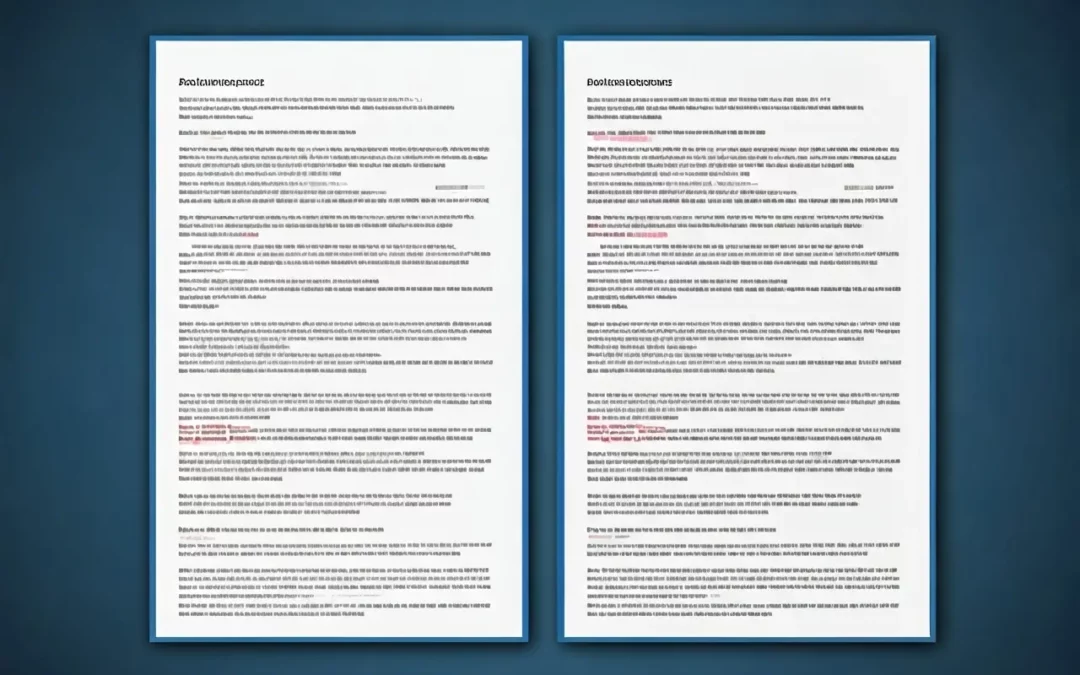
by Aayushi Thadwani | Mar 28, 2025 | Most Viewed
In the world of education and credential verification, understanding the nuances between various documents is crucial. Two terms often encountered are Medium of Instruction (MOI) and Transcript Authenticity. Though they might seem similar at first glance, these concepts serve different purposes. This guide will walk you through the key differences to provide clarity.

1. Understanding Medium of Instruction
The Medium of Instruction (MOI) refers to the language in which the curriculum is delivered. It’s a pivotal document in proving language proficiency, especially when applying to universities in a region where the primary language differs from your own. For instance, if you’re planning to study in an English-speaking country, an MOI certificate can serve as an alternative to standardized tests like IELTS or TOEFL, provided it is accepted by your chosen institution.
Furthermore, the MOI certificate is not just a piece of paper—it tests your ability to engage with your coursework in the language specified. This language proficiency is essential not only in academic settings but also in professional environments where communication plays a critical role. The availability of English in Indian educational settings is increasing, easing the path for many students aiming for global education without additional language barriers.
2. Decoding Transcript Authenticity
Transcript Authenticity is all about confirming that your academic records are genuine and unaltered. This process ensures that the document truly reflects your academic achievements, safeguarded by official seals and sometimes verified by third-party services. Verification not only protects students from identity fraud but also shields institutions from reputational damage that might arise if they admit or hire individuals with forged credentials.
In the digital age, safeguarding transcript authenticity has become more streamlined with many institutions facilitating digital transcripts. This shift towards electronic verification reduces processing time, making it easier and quicker to handle academic document authentication, thus ensuring that candidates can move forward with their academic or professional pursuits without unnecessary delays.
3. Purpose and Usage
MOI serves a distinct purpose chiefly tied to linguistic proficiency, a key requirement for applicants to foreign education systems where the primary instructional language differs from their native tongue. It stands as an assurance to educational institutions of the applicant’s readiness to engage fluently in the institution’s predominant language of instruction.
Contrarily, transcript authenticity plays a pivotal role in validating academic achievements. Employers and academic institutions often rely on authenticated transcripts to assess a candidate’s qualifications accurately. This document verification is a crucial aspect, especially in fields requiring precise calibration of a candidate’s skill set against the job or academic curriculum criteria.
4. Documentation Process
Securing an MOI certificate typically involves submitting a formal request to the educational institution where you completed your studies. Depending on the institution, the process may involve verifying your academic records and providing additional identification to expedite your request. The institution’s registrar or an equivalent authority is usually responsible for issuing the certificate.
On the flip side, the process of ensuring transcript authenticity is more rigorous. It involves safeguarding institutional seals and sometimes requires third-party verification for added credibility. These measures are essential to confirm that the academic records presented are truly reflective of the individual’s accomplishments.
5. Relevance in Higher Education
In the context of higher education, especially when crossing borders for study, MOI can be more than a ticket to bypassing language tests. It reassures the university that linguistic barriers will not intercept learning. This is especially pertinent for students from countries where the educational outcome heavily relies on English as the medium, simplifying admission processes and broadening educational opportunities.
For the academic aspirant, authentic transcripts serve as credentials attesting to the legitimacy of previously acquired qualifications, a non-negotiable in the highly competitive arenas of university admissions and scholarship acquisitions. They provide the trust that institutions need to make informed decisions about the applicant’s readiness and fit for the chosen program.
6. Impact on Career Opportunities
On the career front, MOI certificates can bolster your profile by showcasing your language capabilities. This can be the deciding factor for companies in English-speaking countries or regions, helping differentiate you from other candidates. In some industries, especially those that emphasize multilingual capabilities, presenting an MOI can serve as an added advantage when seeking international employment opportunities.
Authentic transcripts, however, wield significant influence in the job market. They validate not only your educational history but also the calibre of your academic experience. Employers often view these documents as crucial evidence of a candidate’s readiness to contribute meaningfully within their organization, particularly for roles demanding specific educational backgrounds.
7. Global Recognition
Globally, MOI certificates might aid in recognizing your ability to cope in a new linguistic environment. However, their acceptance varies, and they might often be supplemented by transcripts for comprehensive credential evaluation.
Authentic transcripts hold universal significance. Whether pursuing higher education or career opportunities, these documents are indispensable in verifying your academic qualifications. They ensure that your educational achievements are acknowledged and respected across various regional and international standards.
8. Challenges in Verification
Both MOI and transcript authenticity face verification challenges. Institutions may encounter delays in paperwork or discrepancies that can slow down the application process. However, transcripts often face more scrutiny due to their paramount importance in academic assessments and career advancements. Each layer of verification is critical to maintaining the integrity and trustworthiness of the educational document system.
To navigate these challenges effectively, institutions often enhance their systems with digital solutions, facilitating swift and secure credential processing. Leveraging reliable services like World Document Services can streamline the process, ensuring that your educational journey is documented and recognized accurately and efficiently.

by Aayushi Thadwani | Mar 15, 2025 | Most Viewed, Transcripts Services

Navigating the world of online transcript services can be a bit daunting if you’re unfamiliar with the process. Whether you’re seeking accurate transcriptions for academic purposes, legal documents, or business meetings, it’s natural to have questions. In this blog, we’ll dive into the most common inquiries people have about these convenient and efficient services.
Need help with your Online Transcript Services? Contact Us Now!
Everything You Need to Know About Online Transcript Services
In the digital age today, online transcript services are part of the fabric of higher education and professional life. Whether you’re a student looking for admission to higher education or a professional in need of verification of credentials, such services offer a convenient and quick way of getting and furnishing academic records. However, most individuals have questions regarding how such services work, how reliable the services are, and the transcript request process in general.
We have answered the eight most popular questions about online transcript services in order to help guide you through the information.
Read more: Are Online Transcript Services Reliable for Academic Verification?
1. What Are Online Transcript Services?
Online transcript services are platforms or systems by which students and professionals can order, receive, and send academic records online. Universities, credential verification agencies, or third-party organizations offer these services. They eliminate the use of paper records and allow for the online submission of transcripts for easier and more secure access to records.
2. How Do University Transcript Services Work?
Most university transcript services follow a simple procedure:
- The student or candidate request it through the university portal or through offline via university itself.
- The institution verifies the request, checks for the student’s records and all the submitted documents and forwards it further.
- The transcript is subsequently mailed physically or sent electronically by electronic transcript services, depending on the preference of the recipient.
- The employer, institution, or student can later receive the transcript through secure means.
3. Are Digital Transcript Verification Processes Secure?
Security is of the highest importance when handling academic records. Digital transcript verification ensures whether the transcripts are original or have been altered or not. The majority of universities and verification agencies use complex encryption, digital signatures, and blockchain technology to prevent fraud. Employers and institutions can cross-verify records through secure platforms, ensuring the authenticity of a student’s achievements.
4. How Long Does It Typically Take to Get a Transcript?
The duration for receiving the transcripts varies with the institution and the mode of transmission. With electronic transcript services, the transmission can be almost immediate or take hours. Mailed transcripts take a few weeks or days, though. Extra verification, including international orders for the transcripts, takes longer.
5. What Are the Benefits of Online Transcript Services?
There are several advantages of online transcript services, including:
- Speed: Transcripts can be received and dispatched in minutes using digital technology, simplifying application and recruitment procedures.
- Convenience: Students and graduates can order transcripts at any time, anywhere, without having to physically appear at their institution.
- Security: Secure transmission ensures the protection of the transcripts against fraud and misuse.
- Efficiency: Automation frees up administrative time for universities and organizations receiving orders for transcripts.
- Sustainability: Reducing paper-based processes helps in the pursuit of sustainability.
6. How Do I Request a Transcript Online?
The transcript request process is generally straightforward. Here’s a step-by-step guide:
- Visit your university’s official transcript page.
- Log in with your student credentials or alumni account.
- Decide the mode of delivery (electronic or hard copy) and the type of transcript (official or unofficial).
- Enter the recipient details, such as an employer or other university.
- Remit any applicable processing fees.
- Request your wish and confirm it.
- Monitor your request status through the portal if it is provided.
7. What If My University Does Not Offer Online Transcript Submission?
If your institution does not have online procedures for submitting transcripts, you may be required to:
- Visit the registrar’s office in person to request a transcript.
- Send a request form along with any related fees.
- Use a third-party transcription service with which your university collaborates.
- Request that the transcript be mailed if it is allowed by the institution.
8. Can I Send My Transcripts to Multiple Recipients?
Yes! Many academic transcript services offer the option to send transcripts to multiple institutions or employers in bulk. Others might charge an additional amount for bulk orders. It is always best to check with your university or the service provider for bulk order policies.
Read more: 7 Benefits of Using Professional Transcript Services
Conclusion
It does not necessarily have to be challenging to navigate the academic transcript services. Online transcript services offer a simple, effective, and secure process for requesting and submitting transcripts, making life easier for students, alumni, and professionals. With knowledge of the transcript request process, security options, including digital transcript verification, and the benefits of electronic transcript services, you can confidently take control of your academic records. Whether you’re looking for employment, higher education, or professional licensure, these services allow your credentials to be easily accessible when you need them.
Download the World Document Services App
You may enjoy a hassle-free experience by downloading our mobile app from either the App Store or the Play Store. It works with both iOS and Android devices.
Frequently Asked Questions (FAQs)
Q: Are online transcript services universally accepted by employers and universities?
A: Yes, most employers and schools accept electronic transcript services, although it is always best to check with the receiving institution beforehand.
Q: Can I track my transcript request?
A: Most transcript services FAQs indicate that tracking is offered through the online portal, specifically for electronic orders.
Q: How much does it cost to order an online academic transcript?
A: Prices vary by institution and delivery mode. A few institutions provide free transcripts, while others charge for the cost of processing and electronic transmission.
Q: What happens if there is an error on my transcript?
A: If you notice an error, notify your university’s registrar immediately. They may request that you forward a correction request with the necessary documentation.
Q: Do electronic transcripts expire?
A: Some electronic transcripts have a limited lifespan for security reasons. Ensure you download or forward them within the given time frame.











 Call Us
Call Us Mail Us
Mail Us WhatsApp
WhatsApp
